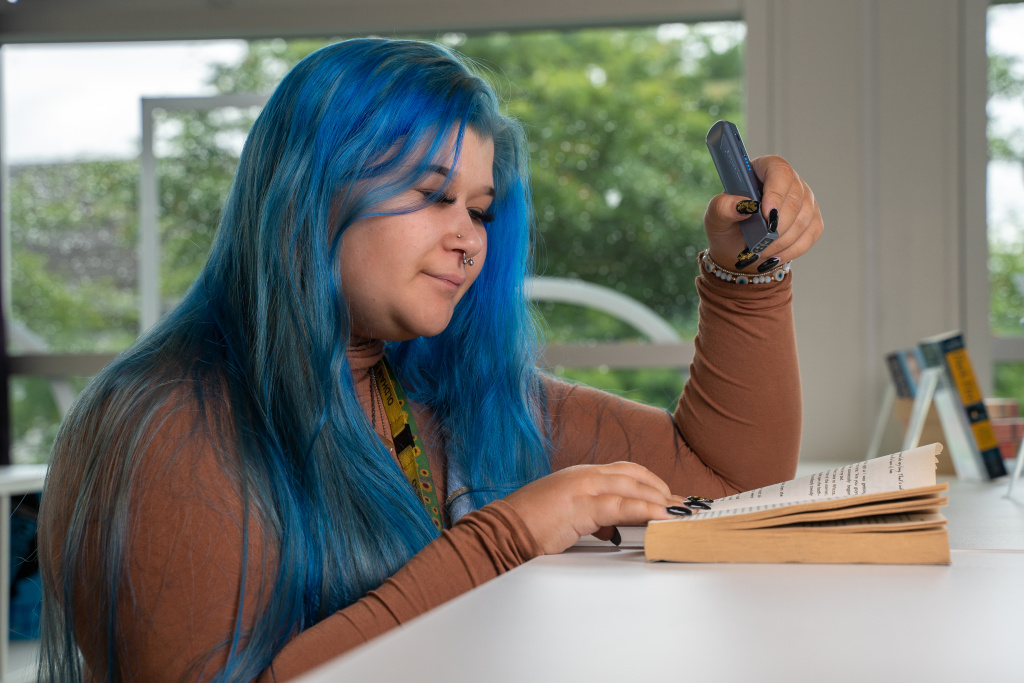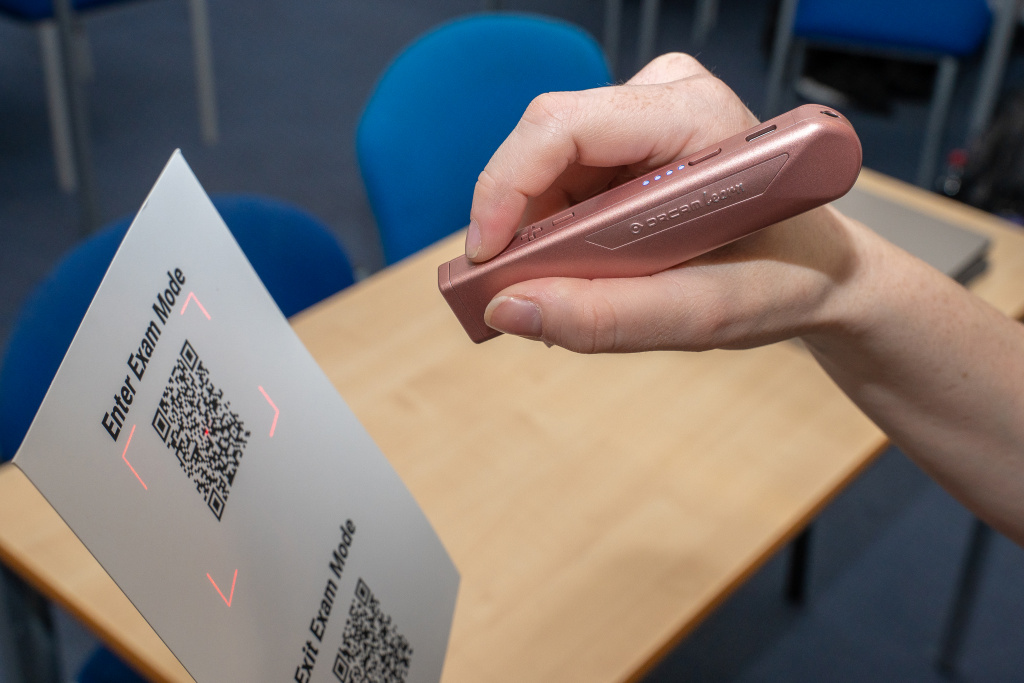
When I spoke to Liz Wilcox, Programme Tutor for Dyslexia, and Faye McLaughlin, Assistive Technologist, at Oldham College, they were very excited. One of their learners had taken an exam the night before our interview. A device called OrCam Learn had read the questions and rubric out to her and she had passed!
Sarah has dyslexia. Recently she has been studying Central Heating Systems in the evening which is one of the modules of her Level 2 Plumbing qualification. While she has improved her literacy skills, exams have been a major hurdle. Many vocational exams are not compatible with text to speech software which left her with the choice of a human reader or overwhelming anxiety.
Sarah has a history of being so anxious in exams that she freezes and cannot read what is on the screen. ‘Being in the room with an invigilator was stressful enough,’ said Liz Wilcox, ‘but having somebody sitting with her and reading to her was a step too far.’
This is a problem faced by many candidates, especially in adult education. It is awkward to ask another adult, one whom you have never met before, to read text out to you. It is even more embarrassing to say, ‘Can you please read that again? No, sorry, can you read it again?’
Exam preparation
Tom who is a course tutor was concerned about whether Sarah would be able to sit the exam at all because he was having to spend a lot of time going over questions with her. He believed that the only barrier was her ability to recognise and read words. Her knowledge and understanding were good but would she deliver on the day?
A human reader or a text to speech device has to be the candidate’s ‘normal way of working’. Well before the exam, Faye had arranged for Sarah to come in for training sessions during the day which were very successful.

There are 5,852 learners enrolled at Oldham College and 325 learners with have agreed exam access arrangements, although this is currently increasing by the day.
So far there are five OrCam Learns which they loan out to students, lesson by lesson. These are wireless, pen-sized device that reads text aloud, not just from a computer screen, but from a whiteboard, a handout, or even text from a poster or a safety notice on a wall.
Sarah continued to borrow one of the five devices when she came to college in the evening. ‘Her anxiety has completely reduced and her independence has shot right up,’ said Faye. ‘She sat the exam last night and she passed it. This has been transformational for her so we couldn’t have asked for a better result.’
Why might a candidate need a reader?
There are many reasons why people have trouble with reading. Dyslexia is one reason, dyspraxia is another as the eye muscles may not work well and make it hard to track a line of print across the page. Many learners, perhaps who are long-sighted or who have neurodiverse conditions may experience visual stress. The student has sore eyes, finds the contrast of black print on white paper causes glare, where the print distorts and may appear to shimmer on the page
Sometimes candidates are offered ‘reasonable adjustments’. The most common example is extra time but this just means more eye strain and a longer exam. A reader or a digital solution such as a reading pen or text to speech software can help candidates who:
• Read slowly or with difficulty
• Find they experience visual stress when they read large quantities of text
• Have problems concentrating when they are reading
• Find it hard to follow lines of text with their eyes
However, it is not just the needs of the candidates that define what constitutes a ‘reasonable adjustment’. An adjustment may not be considered reasonable if it involves:
• Unreasonable costs
• Unreasonable timeframes or
• Affects the security or integrity of the assessment
To qualify as the candidate’s ‘normal way of working’, text to speech must be used in routine schoolwork, class tests, end of year examinations and mock examinations. Ideally, it will be a solution which would serve the candidate well in the workplace and would be a practical solution to help them deal with their workload.
Support for apprenticeships

Gracie wanted to become a hairdresser and was doing well in her apprenticeship but the English was the stumbling block. She has several issues including dyslexia and poor visual-verbal memory but one she knew what the text on the page said, she was full of ideas and insights. She was coming towards the end of her apprenticeship but she had become reliant on a human reader for exams.
Oldham College had to find another solution. It was pressing because she would be retaking the Functional Skills English test and that did not allow for a human reader.
OrCam Learn was the answer for her college work. ‘Because we’ve only got the five devices, we couldn’t let her take one into the workplace,’ said Liz. ‘But I’m a bit of a stickler about making sure it is the candidate’s normal way of working. They need to use it in all their lessons. They need to have that time to really get to know it. We need time to go through the features with the learner so it is totally instinctive before they take it anywhere near an exam.’
Gracie came in over the summer. The OrCam Learn is very easy to use so she really took off and loved her new independence and her skills improved because she was in charge of her reading and learning. Liz said: ‘She sat her reading, functional skills, reading and writing exams, and she passed them both. That was a great relief for her as she wouldn’t have been able to achieve a full apprenticeship without it.’
Spreading the word about OrCam Learn
OrCam Learn is a new technology for the college and is proving a hit, especially on college trips where users can see, hear and track information on posters, labels, timetables and publicity.
When the team gets new technology to trial at the college then it will be included in the staff blog, the student blog, go on the Communications Bulletin and on the big screens around college.
A second strategy is to press the 12 assistive technology champions into action so information spreads by word of mouth. These members of staff who have a monthly training session on different technologies which they then promote to their learners who are struggling. They wear badges so learners and other staff know they can approach them for more assistive technology information.
Once learners have experience of different technologies they can be pressed into service as champions too. They are given a booklet with a sticker each time they have mastered a device or a piece of software. When they have a reasonable experience of using devices, they sit a test to check their knowledge and are then sent out to promote assistive technology around the college. Now when students are referred for assessment, OrCam Learn is something staff can show them very quickly. Liz is encouraging them to ask for OrCam Learn devices as part of their DSA package.
When reading aloud is the exam!
OrCam Learn is an assistive technology device that can become a learner’s normal way of working and help on the day of the exam by giving them access to text. However, It has a Reading Pal function that will train users to be better readers. Once children leave primary school they may have few opportunities for people to hear them read and correct them. Many students who are not confident readers will have strategies in place to help them avoid situations where they read aloud.
Reading Pal uses artificial intelligence to listen to a student reading and to measure:
● Fluency (measured by Words Correct Per Minute)
● Accuracy (% of accurately read words)
● Reading rate (Words Per Minute)
● Total reading time
Amir has dyslexia and as a student on a BTEC Performing Arts course has found it a challenge to sight read scripts. There are actors with dyslexia such as Keira Knightley who have struggled with this aspect of their career. Fortunately, Oldham College has found a solution that works.
‘Amir is now practising reading using the Reading Pal which lets him listen to his reading and gives him feedback on what he is getting right and wrong,’ said Faye. ‘We are having conversations with him about getting one next year when he leaves college to be an actor so he will be able to focus more on his delivery and less on decoding the words.’
The OrCam Learn can be used within examination settings by activating ‘Exam Mode’ (with the QR code) which ensures there is no possibility of any Wi-Fi, cloud or Bluetooth connectivity, making it fully JCQ compliant
– Operating completely offline, OrCam Learn’s Exam Mode is accepted for in-school test-taking, allowing students with reading difficulties to complete exams independently, and without dependence on teaching assistants to read tests and quizzes out loud to them.
Register for free
No Credit Card required
- Register for free
- Free TeachingTimes Report every month